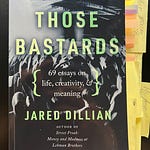Hello everyone,
I’m usually skeptical of fiction involving financial markets. To make it thrilling and get life and death stakes, the genre typically blends with crime or conspiracy. Which means you need an engaging writer who knows both worlds well enough and doesn’t turn the financial combatants into caricatures.
But there are surprises. During my recent trip, I churned through Master, Minion by Paul Podolsky who also writes the Things I Didn’t Learn in School Substack. Master, Minion is a fast-paced and thought-provoking thriller at the intersection of financial markets, geopolitics, and intelligence agencies. Paul started his career in Russia, worked on Wall Street for 20+ years, most of that time at Bridgewater, and spent a lot of time in China as well. He brought all of that to bear in the book.
The story weaves together hot spots from Moscow to Hong Kong and, yes, Boston, with a wonderful depth of detail and cultural observation. Paul’s depiction of the “verbal kung fu” and politics in his fictional hedge fund is priceless. But his real strength is to paint compelling characters ensnared in their respective systems of money and power.
After reading his book and Substack, I reached out to Paul and am excited to share our conversation.
If you can just take one thought with you this Sunday, consider his metaphor for life, the flow and the eddies. The eddies being the loops in which can get stuck in without being aware of it. When I asked him about it, I realized he was the living embodiment of the lessons from Tim Urban’s The Tail End:
One of the reasons I left Bridgewater when I was 52, I calculated how many months I was gonna live. I literally looked at an actuarial table. I think when I left Bridgewater, I had 384 months to live, statistically speaking. And there's a pretty wide range around that, if it's an individual.
I thought about that. These 384 months are gonna come. There's nothing I can do. That is just the flow. How do I stay in that for myself? It's very hard to see, at least it was very hard for me when I was young. You have to listen carefully. What is that real thing that works for you?
There's a period of time where I had no money and I had a young family. Money really, really made a difference, to try to make a comfortable tent, if you will, to sort of shelter them. But a little bit like you, I was thinking inside, this isn't the primary thing that motivates me. If I've got a million bucks now, if next year I have a million dollars and a hundred thousand, and the year after that I have a million dollars and two hundred thousand, that does not actually motivate me. And those months are going by. It's going 383 and 382 and 381… There are eddies that you could get stuck at in life.
We talked about Paul’s journey to writing, his book, intrigue and investing in emerging markets, understanding Russia, and much more. You can find a few quotes below. I hope you’ll enjoy the conversation. I certainly did and look forward to reading more of Paul’s work in the future.
You can listen to this conversation on Spotify, Apple, YouTube, anchor, and via RSS.
The information in these posts and on this website is not and should not be construed as investment advice.
The paradox of writing fiction
The strange thing about fiction is, there's a weird paradox. On the one hand, you're making stuff up. On the other hand, it's sometimes easier to say something true by making something up.
In the real world, you never quite know what other people are thinking. You have a hypothesis. Fiction allows you to create a bunch of characters and imagine their interior world, which is where so much of the mystery and the richness of life is.
A few quotes that stuck from the book (no spoilers):
Working at a hedge fund:
Everyone understood the Boss had money, they, the hangers-on, me included, wanted that money and we all tried to destroy each other to get it. If [the CIA] was a team, this was Lord of the Flies.
The Boss said he liked disagreement, but almost everybody was too scared to disagree.
Understanding certain emerging markets:
The idea that the state itself was criminal was something Americans had trouble getting their mind around. But the Boss might understand. In the Boss’s mind, there were predators and prey, and he had dedicated his life to joining the ranks of the predators. Wealth was a precondition.
Institutions are people:
But the Fed is people and people are wired the same everywhere—ambitious, striving for greatness, prone to error, guilt-ridden.
Great investors understand impermanence:
Most people tend to look at what they are growing up in and think that it is normal, he said. To them it is normal that the US is the richest country. Normal that China is poor. Normal that Black people are poor and white people are rich. But the reality is, things change. Nothing is stable.
Magic in markets:
The signaling felt like primates establishing hierarchy. While the central bankers had the magical power to make the economy expand or contract, the investors had the magical power to become rich.
Some things I learned from Paul during our conversation:
The magic of writing
You spend a lot of time alone trying to … write the bullshit out of an idea. Then you put the story out there and you get what I describe as pings from the universe. The story connects with somebody and you get this response back. It's kind of a magical process that you've created something.
The medieval is alive and well in Russia
The final thing which helped me understand [Russia] is it is medieval, in all that sense. If you think about the picture in your mind about the way Europe was working in the 14th and 15th century. There is a king. You pay tithes. There is palace intrigue. People are poisoned. You could end up in prison for no reason. Rule of law grew out of all of that, but that world is still alive and well in parts of the world. It's a very bizarre thing that a place with a space station that could do complicated computer programs has the medieval in it, but it's there.
And what you're looking at in Ukraine right now is exactly that. It's a land grab for disobeying the emperor or the czar or whatever you call it. And the punishment is death.
The traps of life
There's a quote at the beginning of the book from Chekhov, I should grab the copy off my desk, but basically that ‘life is a vexatious trap.’ And I thought that was actually unbelievably powerful. You see these traps recreated in many different forms. I just think they're more virulent in those other cultures.
Wall Street has that. Money on Wall Street has an addictive character. And people are willing to put up with a lot to endure that. They have these jobs that pay huge amounts of money, but many of them don't involve that much talent. Being a person like the Boss is a different type of thing. You know, a sort of character who can see the future. That's slightly different. And so some of the characters I was trying to get out of the hedge fund are people that are getting these insanely big salaries. Like the chief trader there. And they have this constant insecurity and they're stuck in this system where they love the money, but they don't have the talent to do something outside of that. And so that's that master minion relationship.
And then the secret police in places like Russia or China, they're so corrupt. And I saw this firsthand with families. It's unbelievable that there is no escape. One of the characters actually wants to be a reformer and non-corrupt. And there are people who you will meet in these places there. But corruption has sort of infected his family. He's basically on the payroll of his father-in-law who is tied to all these nefarious things. And that repeats again and again and again and again. You can't extract yourself from it.
Great portfolio managers as artists
I think really exceptional portfolio managers can look at something that's today and imagine a radically different set of circumstances. And their mind works a little bit like a kaleidoscope. In other words, they're staring at the world and they keep shifting the kaleidoscope and it's literally changing every single day.
And they're imagining what that future is. But some of those things are radically different than what we're living through right now. And those are the people that correctly call stock market bubble tops and crises and things. It's a weird thing. There is an element to it that I think is quite artistic. If you think about artists that create stuff that seems really out there initially, but then 10, 20, 30, 40 years later, people are like, this is the most beautiful thing ever done. They're doing the exact same thing. They're imagining a set of pictures in our head that are gonna resonate
“If I can’t understand something, I remove it from my portfolio.”
I saw what was going on in Ukraine. I said, this seems crazy. But what do you do if all of a sudden, the risk of your position has expanded more than what you'd anticipated? You take less risk. I called up all my contacts in Russia and everybody said, he is bluffing. There's no way he's gonna do this. And then I took less risk. And then as we got closer to it, I said, listen, I cannot predict this. I just closed all my positions in ‘21. And the minute he invaded, I closed all my positions in China.
My thought being, listen, if Putin is crazy enough to do this in Ukraine, who's to say that Xi can't do this in Taiwan. I certainly can't. From an investor standpoint, there's other ways of making money. If I can't understand something, I just remove it from my portfolio. And that's one of the reasons I love liquid markets.
Stories and understanding people
People think in stories. Numbers are really important for measuring stuff. But the way people think is in stories. And stories are about feelings and emotions. And the feelings and emotions are relatively limited in number. People have been telling stories for thousands of years and they revolve really around a couple of themes.
Escape, which this book is about, is one of them, and a couple of primal emotions. So to make a story resonate with people, you need to be in that zone for it to work. And so when I'm writing either a non-fiction piece or a fiction piece, one of the things I really try to do, which has taken me years to get to, is just listen: what am I feeling right now? Where is that coming from?
And when I was writing Master Minion, I was imagining, what is going to irritate each one of these people? What's gonna scare each one of them? What do they really want? And you have to be, to make the scenes come alive, you have to be very locked-in, just the way you would be in a business meeting. If you're somebody who's good in a corporation, you have a very rich understanding of everybody around the table, what they want. And when you're writing a book, you're doing the same thing. It's just all the characters are in your head.
George Soros on Putin
I had the occasion a few times in my life to speak with Soros. I spoke with him in, I believe it was January of 2000, two weeks after Putin. Putin came to power December 31st, 1999 if my memory's right. So I asked him, I said, you know, what do you make of Russia's new president?
And he just looked at me and he said, ‘not to be trusted'.’ That was all he said. And that was an example of somebody way out ahead. I mean, think of what came next.
Too much money (or being around it) can make you crazy
There's a little bit of me in every single character, truth be told. Even the diabolical ones. They say, write what you know, and each one of those people draws on strains of yourself.
I think that money can make you crazy. It's a very strange thing. We need money. I've been in very limited circumstances. It's unpleasant, But it's also true that money, too much money, is not good for you. It's a little bit like food.
When you were asking those questions, I was imagining how different it is in another industry. Imagine you're sitting around the table with Tim Cook and he's making 80 million or whatever. And you're the guy that's making a million bucks. Now a million bucks puts you in the top 0.1% of salaries. And you're sitting next to him and you're like, but this guy's not that much smarter than me. He's earning 80 million. I guarantee you there's somebody in that room thinking that way, cause people are people.














Share this post